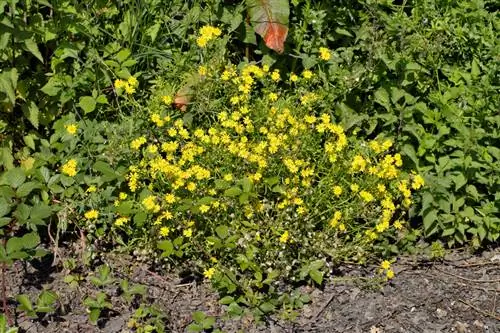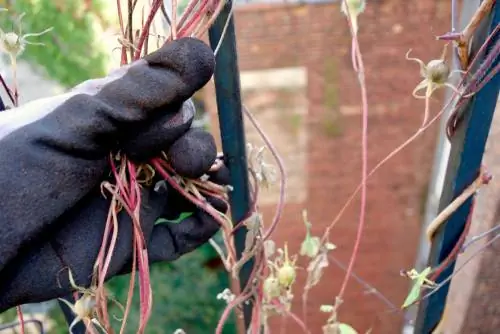- Author admin [email protected].
- Public 2023-12-16 16:46.
- Last modified 2025-06-01 06:02.
White funnel flowers, long, wafer-thin shoots, small round leaves - the morning glory looks really gorgeous. But many gardeners in whose beds it grows or whose property it spans are not happy about the sight of it.

How can you successfully combat fence bindweed?
To effectively combat fence bindweed, you can dig it up and remove roots, cover it with foil or pile up new soil. Alternatively, you can use mulching, vinegar and s alt, boiling water or special plants and herbicides.
Weighing up: Is fighting worth it?
For many gardeners, the morning glory is considered a weed that does not fit into the flawless and uniform image of the garden and must be removed. Most people don't care that this wild herb also has many benefits.
If you want to fight her, you should know that she is extremely stubborn. It has meter-deep roots and likes to reproduce via runners and root shoots. It is often hopeless to destroy them permanently. Even chemistry is no more promising here than mechanical cultivation of the soil.
Method No. 1: Dig up fence bindweed and remove roots
It's worth a try, you think? Then try this proven method. But remember beforehand: Digging up usually only curbs the growth of the fence bindweed. The plant rarely disappears forever.
How to do it:
- start in spring
- Pull out above-ground shoots by hand when the soil is moist
- Dig the earth up to 1 m deep with a digging fork (€139.00 on Amazon)
- Put the soil and the fine roots through a sieve
- Selecting and destroying roots
Method 2: Cover fence winch
Covering the fence winch with black foil is less visually appealing:
- first dig up soil
- remove larger plant parts
- Place foil over it
- Lay bark mulch or stones over it to weigh it down
- Wait for 1 year
Method No. 3: Pour up new soil
It is really effective if you remove the soil that has become infested with the bindweed and replace it with new soil. This is especially useful if the bindweed grows in the bed and is difficult to remove from there.
Other control methods
Here are more ideas:
- Mulch the soil thickly
- destroy with vinegar and s alt
- kill young specimens with boiling water
- Plant marigolds or phacelia in the immediate vicinity (drive away morning glories)
- hoe the soil regularly and destroy the roots
- in the lawn: mow regularly
- Use of herbicides
Tip
If you do not remove the roots after chopping them up, you must expect that the morning glory will then spread more widely (via root shoots and runners).






